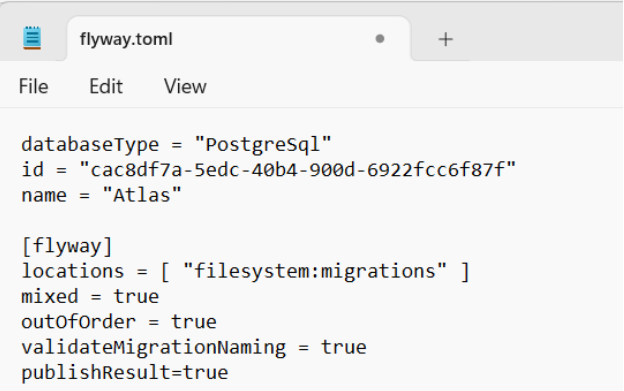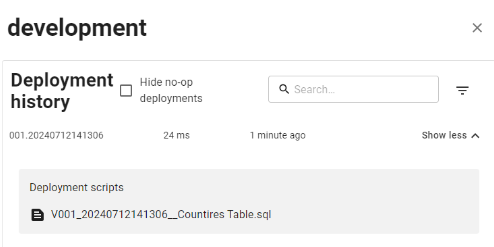Quickstart - Flyway CLI
Published 17 July 2024
The easiest way to experience the Flyway Service is using Flyway CLI.
- Configure your Flyway project by adding a databasetype, id and name at the top of your project's flyway.toml file.
databaseType = "PostgreSql"
id = "InsertGUIDhere"
name = "ProjectNameHere"
- You can generate a guid here: Online GUID Generator (encrypt-online.com)
- The conf/flyway.toml can be found in your Flyway project folder.
- Save the file.
Note: The service does not currently work with flyway.conf files this is something we are working on resolving, please contact adam.britt@red-gate.com if this is something you require. To use the service now learn how to convert a conf file to a TOML file here
2. Authenticate with Flyway CLI
- To use the Flyway Service you will need to authenticate Flyway CLI so that it can communicate with the Redgate Hosted Service.
- To do this run the following command on Flyway CLI
flyway auth -IAgreeToTheEula
3. Publishing insights to the Flyway Service
- To see your deployment event being published to the service all you need to to is to deploy a migration script to a target of your choice using the following CLI parameters.
- Ensure that you have at least one pending migration script
- Run the following commands on your target environment
flyway migrate -url=InsertEnvironmentUrlHere -user=InsertUserNameHere -password=*** -publishResult=true -checkDriftOnMigrate=true -environment=InsertEnvironmentNameHere
4. Viewing your deployments in the Flyway Service
The flyway migrate operation has now published its results to the Flyway Service. Simply visit https://flyway.red-gate.com/ to open the pipeline dashboard view.
You can drill down to to view any environments that have deployments registered against them for a specific Flyway project.
Use show more to view the detailed deployment history for an environment.










